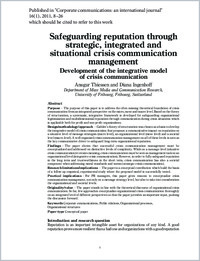Safeguarding reputation through strategic, integrated and situational crisis communication management : development of the integrative model of crisis communication
- Thiessen, Ansgar Department of Mass Media and Communication Research, University of Fribourg, Fribourg, Switzerland
- Ingenhoff, Diana Department of Mass Media and Communication Research, University of Fribourg, Fribourg, Switzerland
-
2011
Published in:
- Corporate communications: an international journal. - Emerald. - 2011, vol. 16, no. 1, p. 8-26
English
Purpose – The purpose of this paper is to address the often missing theoretical foundation of crisis communication from an integrated perspective on the micro, meso and macro level. Based on the theory of structuration, a systematic, integrative framework is developed for safeguarding organizational legitimization and multidimensional reputation through communication during crisis situations which is applicable both for profit and non-profit organizations. Design/methodology/approach – Gidden’s theory of structuration was chosen as a basis to develop the integrative model of crisis communication that proposes a communicative impact on reputation on a situative level of message strategies (micro level), an organizational level (meso level) and a societal level (macro level). A well-organized crisis communication management on all of these levels is seen as the key communicative driver to safeguard long-term organizational reputation. Findings – The paper shows that successful crisis communication management must be conceptualized and addressed on distinctive levels of complexity. While on a message level (situative crisis communication) it creates meaning, crisis communication must be seen as management task on an organizational level (integrative crisis communication). However, in order to fully safeguard reputation in the long term and trustworthiness in the short term, crisis communication has also a societal component when addressing moral standards and norms (strategic crisis communication). Research limitations/implications – The paper is a conceptual contribution which build the basis of a follow-up empirical, experimental study where the proposed model is successfully tested. Practical implications – For PR managers, this paper gives reasons to conceptualize crisis communication management, not only on a message strategy level, but also to take into consideration the organizational and societal levels. Originality/value – The paper stands in line with the theoretical discourse of organizational crisis communication. So far, few approaches conceptualize organizational crisis communication thoroughly on an integrated level of different perspectives so that the paper provides an important input, pushing the discussion forward.
- Faculty
- Faculté des sciences économiques et sociales et du management
- Department
- Département des sciences de la communication et des médias
- Language
-
- English
- Classification
- Information, communication and media sciences
- License
-
License undefined
- Identifiers
-
- RERO DOC 278672
- DOI 10.1108/13563281111100944
- Persistent URL
- https://folia.unifr.ch/unifr/documents/305394
Statistics
Document views: 165
File downloads:
- Document: 541
